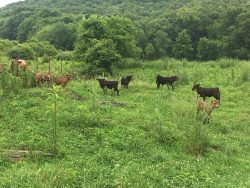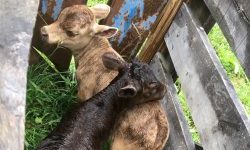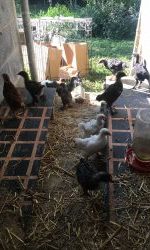Spiderwebs Adorn My Hair

To work with large animals and operate heavy machinery, to wield tools and use the fullness of my strength, is to feel a certain type of power that many women do not have access to in their daily lives.
A feeling that is certainly not lost on men doing these same things. This power is a reminder that I am capable—of being self-reliant, of owning my own farm, and of taking care of the people around me. Some men feel threatened by women possessing this power, and have expressed to me as much, in various unsavory ways. It should not feel emasculating to see women able to perform the same tasks as men. Rather, what is truly shameful is to try to bring them down to continue feeling superior.

At the Harvest Table, I work with people who understand that food is a human necessity that has no gender. Here, I am given the right amounts of freedom and responsibility to do the work that needs to get done and grow as an individual. As I explore and stretch my capabilities, Jason expresses full confidence in me, rather than undermining my competency. I am simply asked to go get the tractor and till a field, not walked through every step of the process over and over before being told that it is probably too difficult for me anyway.
This is crucial.
In an environment where my abilities are doubted, where men say ‘let me do that for you’ and never allow me to learn to do it myself, my growth is stunted. The Harvest Table is fully committed to helping beginning farmers get their start, which requires a steep learning curve and a lot of confidence building. The importance of not being patronized during this process cannot be overstated. When I feel that my mentors have faith in me and I am given the opportunities to assure them, I become more solid in my footing to step out on my own.

When I am farming, I am free in the way I was as a child, and in the way I have not been since the age that girls are told to stop picking up worms; not to climb trees or ruin their pretty dresses. I dress for work with only safety and practicality in mind. I wear perpetually dirty old jeans and floppy t-shirts I found at the Goodwill.
I don’t have to be prepared to be seen or move in a ladylike way. I can run cattle through a head gate, climb fences, haul overfilled wheelbarrows, slog through mud, and move freely without worrying about my presentation. By shedding the social expectations of my gender, I am better able to do the truly feminine work of growing food for others.
The practice of agriculture was built by early women, who had the knowledge of plants and the ways to domesticate them.
In much of the world, women are still an integral part of the agricultural system. In America, only 30% of women are farmers (far less by certain metrics), and women control only 7% of US farmland. We have a culture that discourages women from being farmers at every step of the way. “Girls can’t…” is drilled into our brains from grade school or earlier. Female farmers struggle to be taken seriously everywhere from the feed store to the loan office, and are at a major disadvantage because of it. Using tools and machinery has never been something that women are inherently less able to do; it is only discouraged because it lies outside the boundaries of our gender roles. With its heavy lifting and sweating, crawling and getting dirty, farming is decidedly unladylike, but that is to say nothing of its femininity. Starting new lives, tending to the vulnerable, and taking on the responsibility of providing nourishment for other people are entirely feminine acts, in the most fundamental sense. Farming requires a thoughtfulness and care, to patiently and attentively nurture the growing plants and animals filling the fields and pastures, not just the strength and energy to get tasks accomplished.

Both feminine and masculine traits are within reach of all genders, but women have been trained all our lives to foster these skills and hold them ready at hand. Worldwide, it has been proven that when women are allowed access to the resources they need to succeed in agriculture, they greatly benefit their societies as a whole. In a profession dominated by men, programs like F.A.R.M. are essential to help support beginning female farmers to achieve their goals. As with any minority in any career field, extra support and conscious effort are required to level the playing field for all. Helping women farmers build their skills, knowledge, and confidence can go a long way towards making farming a more diverse and inclusive profession—a profession that thrives on a balance of masculinity and femininity.
Many Hart – 2018 FARM Intern, Harvest Table Farm